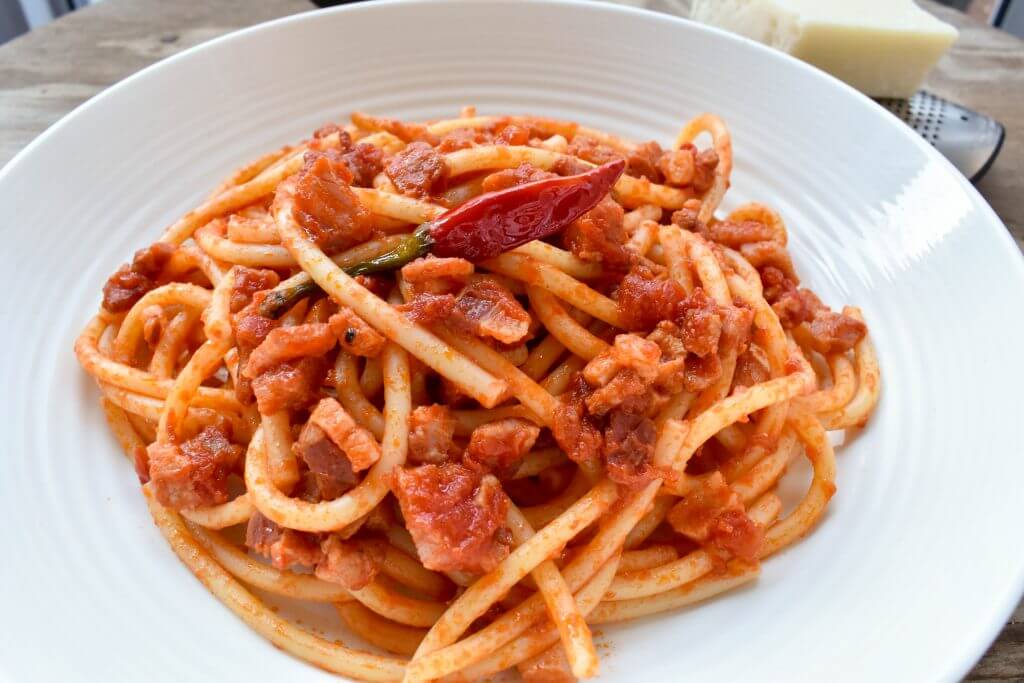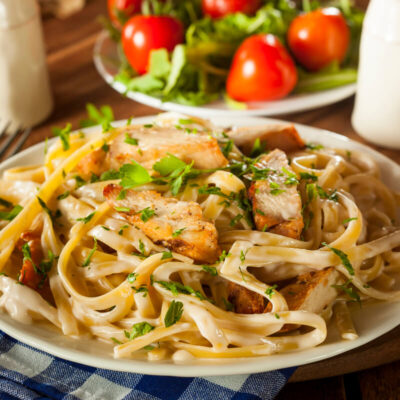Ingredients
- 2 tbsps Olive OilExtra virgin
- 4oz PancettaThinly sliced
- ½ tsp red pepper flakesCrushed
- ½ tsp pepperFresh ground
- ¾ cup Onionminced
- 2 Garlic clovesminced
- 1 can (100g) of San Marzano tomatoes
- kosher salt
- 2 Packs of Bucatinidried
- ½ cup Pecorinofinely grated
Directions
Difficult as the name seems, the dish does bring one into a hallucinating yet confused state due to a familiar name. Worry not, and don’t run from its difficult pronouncing name as it carries the same instructions as to any other pasta dish.
Yes, we are talking pasta here, and it’s a recipe that only scares others with its name! We are talking about authentic Thai cuisine pasta made from well-known meat choices and tomato-rich sauce.
Discussion seethes over the right method to make an exemplary Roman amatriciana sauce of restored pork and tomatoes. We tried every one of the factors to come up with this ideal form, which packs a fragile warmth, delicate red pepper flavor, sharp Pecorino Romano cheddar, and the charming transaction of sweet-tart pureed tomatoes and rich, greasy restored pork.
Why does It work?
Chili flakes add heat without diverting flavor into the dish, while a more modest portion of dark pepper offers barely sufficient musky zest to keep things intriguing.
This briskly cooked sauce isn’t just quick and simple; it additionally guarantees that the tomato flavor stays splendid—an essential difference for the rich pork.
Completing the pasta in the sauce covers every noodle with a lot of flavors.
AL-MAGNIFICO!
Brisk, easy, and completely delightful, this bucatini all’amatriciana formula – in the same way as other exemplary Italian pasta dishes – stands the trial of time. The trick of the trade in this dish lies in its quality fixings – the delightful guanciale, Pecorino Romano and San Marzano tomatoes have a significant effect.
Named after Amatrice, a mountain town in Lazio, Amatriciana is one of the locale’s most acclaimed pasta dishes (alongside Gricia, Cacio e Pepe, Arrabbiata, and seemingly the most celebrated, Carbonara). All are speedy and simple to make, however they should be cooked with care and consideration.
Quality fixings are the key here; San Marzano tomatoes might be more costly than a normal tin, yet they are certainly justified regardless of the sticker price. They have fewer seeds, which make them extraordinary for sauces, and their flavor is better and somewhat less acidic.
Guanciale is restored pig cheek, and it has a more grounded, porkier flavor than other relieved meats. It truly adds profundity of flavor to the dish (however, great pancetta can be utilized, all things being equal if you can’t find it anyplace).
Amatriciana is normally matched with Bucatini, a thick, empty spaghetti-like pasta that gets the sauce brilliantly. However, spaghetti or even penne can be utilized here, all things being equal.
Similarly, as with most local dishes, each family has its variety. Consider the option of finely diced onion or stew to your Amatriciana sauce if you need to add flavor measurement.
Steps
1 Done | Take a large and heavy skillet and heat some oil on medium heat for 2 minutes. Add in the meat chosen from the options above and saute until it turns crispy and golden in color. |
2 Done | When the meat changes color, add in the pepper flakes and black pepper and stir the mixture for 15 seconds. |
3 Done | Next, add garlic and onion and stir continuously. Make sure to keep the heat on medium level, or onions will burn fast. |
4 Done | Once the vegetables turn soft, add in the tomatoes and reduce the heat. Stir occasionally until the mixture takes a well-merged form and is ready for the next step. The mixture will be thick and a little saucy for tomatoes, so that will be your hint. |
5 Done | While creating your mixture, take another bowl and start working on your pasta on the other hand. Boil water in a deep pot, and once the boil comes, add in a spoon of salt along with pasta and stir occasionally. Once al dente, strain it sink in a draining basket but save a cup of straining water for the recipe for later use. |
6 Done | Pour the strained pasta into the meat mixture and toss vigorously. Add in half of the pasta water and cook for 3 minutes until the water well-merges into the recipe. See if you want saucy pasta, then add in the remaining pasta water and cook on low heat for three more minutes. Add cheese and cover with shallow heat for 2 minutes to let the sauce and cheese sink in well. |
7 Done | Once the mixture sets, serve the dish in mini deep bowls. BON APPETITE! |









